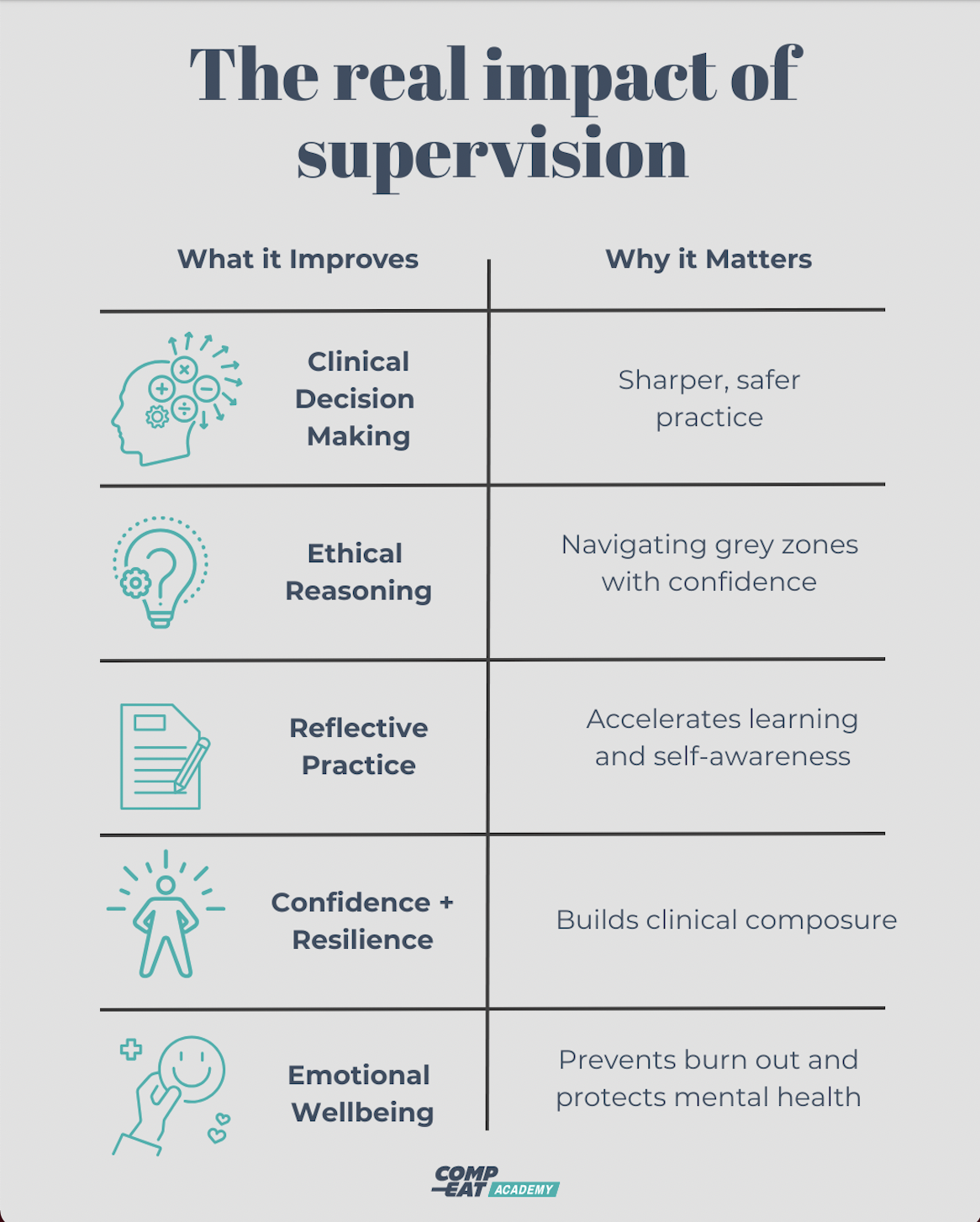The Dietitian’s Edge: Why Supervision Should Be Standard
Supervision has long been a staple in fields like psychology, social work, and psychotherapy – but in dietetics, it’s only just starting to gain the recognition it truly deserves. That’s slowly changing, thanks to growing research highlighting the real and measurable benefits that professional supervision offers to dietitian’s at every stage of their career.
So, why should we view supervision as essential – not optional?
Let’s break it down.
Why Supervision is on the Agenda
A recent narrative review by Crow et al. (2025) sheds light on the state of supervision in dietetics. Despite being recommended in national competency standards (and mandatory in many other health disciplines), supervision in dietetics remains underutilised.
The paper defines supervision as a contracted, collaborative professional relationship between a supervisor and supervisee, designed to support learning, reflection, and the development of safe and ethical practice.
The evidence? Supervision works. And here’s how.
Key Findings from the Research
Crow and colleagues identified four essential components that underpin effective professional supervision:
- Supervisor–Supervisee Alliance + Contracting
A shared understanding of goals, boundaries, and expectations is critical. When supervision is formally contracted and structured, both parties benefit from clarity and accountability.
- Functions and Outcomes of Supervision
Supervision improves:- Clinical decision-making
- Ethical reasoning
- Reflective practice
- Confidence and resilience
- Emotional well being
- Frequency Matters
Sporadic check-ins don’t cut it. Consistent, ongoing supervision is what builds trust, depth, and meaningful professional development.
- Format Flexibility
Supervision isn’t just one-on-one. It can be delivered through group sessions, peer reflection, or specialist supervision (e.g., eating disorders, private practice). The format should match your needs and the context in which you work.
Supervision is protective, empowering framework that improves performance and sustainability, regardless of your title or setting.
Supervision in Practice: Why It Matters
For dietitians working in high-pressure or complex environments, supervision can be the difference between surviving and thriving. It offers:
- A safe space to unpack clinical cases and ethical dilemmas
- An opportunity to reflect on your own growth and challenges
- A buffer against burnout, isolation, and imposter syndrome
- A place to receive feedback and improve critical thinking
And importantly: it’s not about being told what to do. It’s about being supported to discover, evolve, and lead with clarity.

To explore these concepts further, you can check out our free Live Q&A with Alicia, where she breaks down the research and shows how supervision can practically and powerfully show up in your work.
Supervision That Actually Supports You
Supervision isn’t just something you “should” be doing. It’s something that can fundamentally shift your confidence, clarity, and connection in practice. It’s one of the few professional tools that actually sustains you as a clinician, not just improves you.
That’s why we’ve built Pro Membership in the Compeat Academy to include:
- Monthly Group Supervision for regular connection and growth
- Quarterly Group ED Supervision to navigate complexity with confidence
- Support from peers and leaders who get it
These sessions are built on the exact principles outlined in the research – contracted, consistent, collaborative, and structured for real outcomes.
If you’re ready to feel more supported, capable, and grounded in your practice, this is one of the best investments you can make in yourself and the people you support.
References.
- Crow T, Kiely L, Harris D, Palermo C. Professional supervision in dietetics: A comprehensive, narrative literature review. Nutr Diet. 2025 Jul 4. doi: 10.1111/1747-0080.70023. Epub ahead of print. PMID: 40613675.



